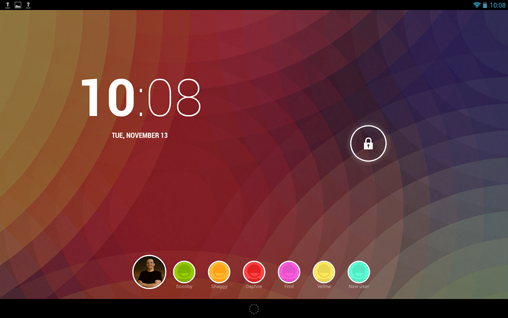Android 4.2 multiuser support: Hands-on impressions and gallery
Google's Nexus 4 and Nexus 10 are finally on sale today -- and with the devices' launch, we're also getting a look at a couple of noteworthy new features of Android 4.2 that had previously been under wraps.

One of them is the added support for multiple users on Android 4.2 tablets. I've been playing with the feature since last night, and I've gotta say: This may be one of the most significant additions Android has ever seen.
The feature is exactly what you'd think: As of Android 4.2, any tablet can be configured to allow multiple users, each of whom maintains his own separate home screen setup, apps, wallpaper, and general settings. (The feature is available only for tablets, including the Nexus 10 and Nexus 7 -- not for phones.)
To get started, all you do is head into the main system settings menu and find a newly added section entitled "Users." There, you tap an option to "Add User" and follow a few prompts to get an additional account up and running. The whole process takes a minute or two. You can opt to connect each user to a Google account or not; obviously, if there's no Google account, the user will be limited in what Google services she can access (including the Play Store for app downloads).

Once a new account is added, your lock screen will show small circles representing each user's photo or avatar. When you tap on a user's icon, there's a delay of a couple seconds and then the lock screen changes to reflect that user's background, notifications, and security settings.


All user-specific security settings are respected, so if one user has a PIN or pattern enabled, that code will still be required to gain access to his account.

If there's any limit on the number of user accounts you can add onto a device, it's a high one: I added seven users onto my unit and didn't hit any type of cap.

You can change users anytime from the lock screen or from anywhere within the system: The new Android 4.2 "quick settings" menu, which is accessible by swiping downward on the top-right of the screen, has an icon that shows the current user's name and avatar. Tapping that icon takes you back to the lock screen and lets you quickly switch to another user.

Certain tablet-wide settings, like Wi-Fi details, are universal -- and changes made by any user will affect all users of the tablet. All user-specific data and preferences, though, remain separated; when you're signed in as one user, you don't see and can't access any other user's photos, apps, or information. Even screenshots remain invisible to any user other than the one who captured them. (Rooting a device would presumably allow you to get into some of that stuff, but for the majority of typical use scenarios, it's very well walled off.)
With apps, the system is intelligent: If one user goes into the Play Store and installs an app that another user has already downloaded onto the tablet, Android will "install" the app for the user -- basically making it available to her -- but won't actually redownload it. And that user's app-specific data and settings will remain separate from other users' information; when a new user opens the app, it's as if the app is being opened for the first time. I tested this with a handful of apps, including third-party programs like Facebook, and it worked flawlessly.
The primary user -- the one who signed into the tablet initially -- is like an admin of sorts and retains exclusive control over the user account settings. Only that person can add or delete additional users from the tablet.

All in all, I'm very impressed with what Google has done here. Multiuser support on tablets makes a lot of sense -- and adding that feature onto the platform delivers a massive amount of value that'll go a long way in setting Android apart from the competition.
For couples, families, or even roommates, being able to share a tablet and pass it off without having to worry about someone else getting into your stuff or messing up your setup is a powerful feature to have -- and it's one you won't find in many places.
Copyright © 2012 IDG Communications, Inc.





